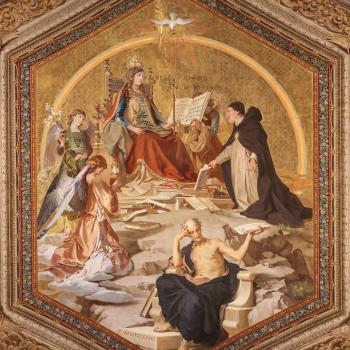When we are in a relationship with God, the encyclical implies, we will not find God's command's burdensome. Rather they are borne out of love for God, and others.
The Decalogue is not a set of negative commands, but concrete directions for emerging from... the selfish and self-enclosed ego to enter into dialogue with God, to be embraced by his mercy and to bring mercy to others...
The Decalogue appears as the path of gratitude, the response of love, made possible in faith... receptive to the experience of God's transforming love for us. (LF, 46)
For the Christian who loves God, the Decalogue is not a restrictive list of "thou shalt nots" but an interior conscience that offers the freedom to live out one's love for God. This love for God is the impetus to live in conformity with all the Church professes, lives, worships, and prays... "all that she herself is, and all that she believes." (Dei Verbum, 8)
Believers understand that the Church presents a unity of faith and an integrity of faith. St Paul taught "There is one body, and one Spirit... one faith." (Eph. 4:4-5) This faith unites all believers to a common vision; "we receive a common gaze." (LF, 47)
This is a further development of the idea that we do not live the faith alone, and cannot live it in a vacuum. This common faith brings us into communion—a unity of faith—with one another.
By professing the same faith, we stand firm on the same rock, we are transformed by the same Spirit of love, we radiate one light and we have a single insight into reality. (LF, 47)
This unity in faith is derived from the integrity of what we believe. The faith is consistent and does not change. It is we who are changed by it. This is one of the primary roles of the institutional Church, to be the guardian of the deposit of faith, and to be on mission to share it with the world.
The faith is based on the whole truth handed down intact from the Apostles, with the continuity and assurance of the Holy Spirit, as Jesus himself guaranteed.
Since faith is one, it must be professed in all its purity and integrity. Precisely because all the articles of faith are interconnected, to deny one of them, even those that seem least important, is tantamount to distorting the whole. Each period of history can find this or that part of faith easier or harder to accept: hence the need for vigilance in ensuring that the deposit of faith is passed on in its entirety (Cf. 1 Timothy 6:20) and that all aspects of the profession of faith are duly emphasized. (LF, 48)
When I read these lines from Lumen Fidei, I am challenged and reminded that we must not fall into a kind of "cafeteria Catholicism" that rejects the unity of faith that the Church has maintained. Tempting as it might be, we cannot select what doctrines of Catholic belief we wish to believe and live by, as if we were selecting items from an a la carte menu.
Further, we reject the unity of faith when we choose to ignore or live without certain beliefs; we are breaking our communion with God and with each other. If we forsake the unifying and universally Catholic way in order to go our own way, we make our preferences into a god of our choosing. We oppose rather than trust the God who first chose us. We bring discord, disunion, and disintegration of the one faith and one Church.
Francis goes so far as to suggest that holding to the unity of faith indicates our unity with the Church, and without it, we are breaking the bonds that Christ died to create.
Indeed, inasmuch as the unity of faith is the unity of the Church, to subtract something from the faith is to subtract something from the veracity of communion... harming the faith means harming communion with the Lord. (LF, 48)
This is a stirring measure with which to examine our own hearts and minds to discover the real depth of our faith and true communion with Christ and the Church.
Let us pray for the grace and the docility to the Holy Spirit to embrace all that the Church believes, that we may stand in union with Christ and with one another.





